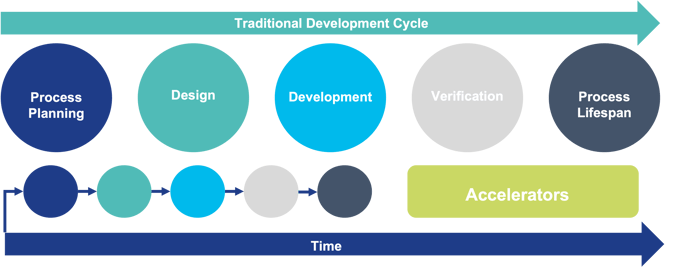Posted by:
Antish Awootar
Publish Date:
30 Jun, 2022
In a project we completed with Bahrain’s Nation Bureau for Revenue (NBR) in 2019, time was tight. We had under a year to roll out a tax system for a new VAT regime.
We rolled out in under six months.
The project was planned meticulously with landmarks and timescales clearly mapped out and adhered to with hawk-like attention. But the fastest go-live ever heard of in the taxation space wouldn’t have been possible without the use of accelerators.
How accelerators made the seemingly impossible achievable
The platform to be rolled out was based on SAP’s TRM, however, like most projects, there was a degree of customization needed to deliver what the NBR was looking for. Having worked previously with other public authorities to create digital tax platforms, we were able to use accelerators to make it possible to meet these bold timescales – just one of the benefits of partnering with the premier supplier of SAP to the public sector.
Accelerators are an immensely powerful tool when it comes to implementing SAP S/4HANA platforms, enabling greater customization without the extensive programming time, the longer testing times, and the increased costs involved in traditional customization.
What is an accelerator?
These days, many companies opt for a commercial-off-the-shelf (COTS) ERP solution. These solutions tend to come with a certain level of pre-delivered inbuilt components included as standard. Typically referred to as ‘standard functionality’ these can usually be used almost immediately with only minor configuration. However, no two organizations are the same, and there is no industry where this is more relevant than the public sector.
In the public sector, most business processes are defined by legislation and vary from country to country. This means there are always custom procedures unique to the organization that needs to be taken into consideration.
Coding to customize these nuances into the COTS software would take a good deal of time and effort, and further testing would be required to ensure the stability of the new code. Then any changes in legislation or the requirements or operation of the business may require their bespoke code to be altered and then retested before it can be rolled out. This doesn’t only add cost to the initial roll-out but also increases the ongoing support required too, driving up the ongoing costs incurred. Introducing new code also brings with it a greater element of risk. Should this process be handled incorrectly, the existing processes can be affected. These factors mean that, from a best practice perspective, it’s advisable to minimize any custom developments.
Accelerators are applications or prototypes that are not part of the standard COTS solutions, but have been thoroughly designed and built on a set of best practices. As they are developed, the design process accounts for all possible scenarios of a particular business process, delivering a custom-built framework that allows full configuration and behaves as part of the standard solution. The application of accelerators removes a substantial segment of the traditional development process, replacing it with a ready-to-roll module.

The benefits of using an accelerator
Accelerators replace a segment of the traditional development cycle, speeding the build process and, as the accelerator is pretested, it also reduces the time spent in testing, allowing for a faster go-live and a more rapid return on your investment.
Using accelerators to reduce the amount of bespoke coding required also increases the stability of the platform, leaving less opportunity for risk with new and untested code.
The long-term stability of the platform is also better protected with the use of accelerators, which avoid the addition of code added by different engineers over time to accommodate legislation and operational changes.
When can you use accelerators?
Accelerators can be used in place of any customization, providing it delivers the capabilities that you’re looking for. Choosing the right partner to work with you to build and roll out an ERP platform can play a large part in the availability of accelerators and, in turn, the overall cost and speed of your integration. Having rolled out public sector ERP platforms in 8 countries, invenioLSI has an established portfolio of accelerators for this sector that can be called upon when required, enabling a faster, smoother, and safer roll-out.
The future of accelerators
Customers are becoming increasingly demanding, harboring expectations of rapid deployments and faster time-to-value. Meanwhile, legislation changes and technology changes mean that the environments these platforms are expected to perform in are increasingly challenging. Customers demand solutions that offer ultimate flexibility, enabling them to adapt rapidly to new opportunities brought about by technology, or to new legislative requirements.
The most time-efficient and cost-effective way to do this is by using accelerators to enhance COTS solutions and, as expectations continue to rise and demand increases, the need for accelerators will increase too. Accelerators are already essential for rapid, seamless ERP rollouts, whatever the industry, but over time the need for speed is likely to become increasingly important, making accelerators increasingly critical. This means that when choosing a partner to support you as you introduce an ERP solution, it’s important to look at the partner’s access to tried and tested accelerators and also to consider the expertise they have in the industry within which you operate.